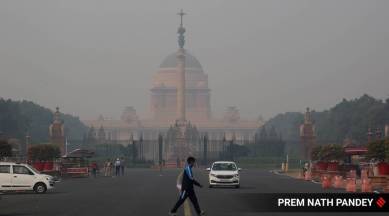Stay updated with the latest - Click here to follow us on Instagram
Which masks can help reduce exposure to pollutants? Here’s what Delhi doctors say as air quality dips
“Cloth masks and surgical masks have no role in preventing adverse health effects of air pollution (unlike in Covid)."

As Delhi’s air quality deteriorated once again to hit the ‘severe’ category Thursday morning, doctors said wearing a cloth or a surgical mask may not be effective while N-95 masks can help reduce exposure to pollutants to an extent.
“Cloth masks and surgical masks have no role in preventing adverse health effects of air pollution (unlike in Covid). An N-95 mask, when fitted properly, is likely to reduce exposure to pollutants (not a WHO recommendation though). However, it is difficult to exercise with an N-95 mask on,” said Dr G C Khilnani, chairman of PSRI Institute of Pulmonary, Critical Care and Sleep Medicine.
monthly limit of free stories.
with an Express account.
Dr G C Khilnani said while N-95 masks can help reduce the effect of pollution, there is no evidence to support their efficacy. A member of the Technical Advisory Group of Global Air Pollution and Health of the WHO, he said that during a meeting of the group in Geneva, it was concluded that masks do help in stopping pollutants from entering the body, but it was based on 50-60 AQI, which itself is a massive number in European countries.
“But in India, when every day, the AQI is reaching 400-500, the masks can hardly be of any use. However, masks such as N-95, KN-95, and N-99 can (still) be used,” he added.
According to Dr Desh Deepak, Senior Respiratory Consultant at Ram Manohar Lohia Hospital, N-95 masks can help prevent particulate matter of size 2.5 microns and below: “The larger particles can be prevented by using a cloth and surgical mask.”
He also said it is better to use cloth masks and surgical masks than not wearing one at all. He elaborated that while N-95 and N-99 masks can help in preventing particulate matter pollution, they cannot help in stopping gaseous and volatile gas pollution.
“For gases such as carbon dioxide, monoxide, methane, and sulphur oxides, we need masks that can adsorb gases. There are cartridge-based masks available for that, but they are expensive and heavier to use… and the cartridge has a life span. For volatile gases, there are occupational masks but they are expensive and are very heavy for a common person to use in daily life,” he added.
“So practically speaking, N-95 and N-99 masks are best suited which are available easily post the pandemic,” Dr Deepak said.
Meanwhile, Dr Avi Kumar, Senior Consultant of Pulmonology at Fortis Escorts, said normal disposable surgical masks have an efficiency of 40-50% and are quite effective in preventing inhaled pollutants but should be changed every six-eight hours.
According to Dr Ashutosh Shukla, Medical Advisor and Senior Director of Internal Medicine, Max Super Speciality Hospital Gurgaon, good quality N-95 and N-99 masks protect one from harmful effects of pollution and from viral flu and Covid. “They prevent entry of pollutant particles of an average size of 2.5 microns, but they can also filter out particles as small as 0.3 microns which include common viruses. For people with a medical problem like asthma or chronic bronchitis, an N99 mask is advisable. For healthy individuals, an N-95 mask is adequate,” he added.